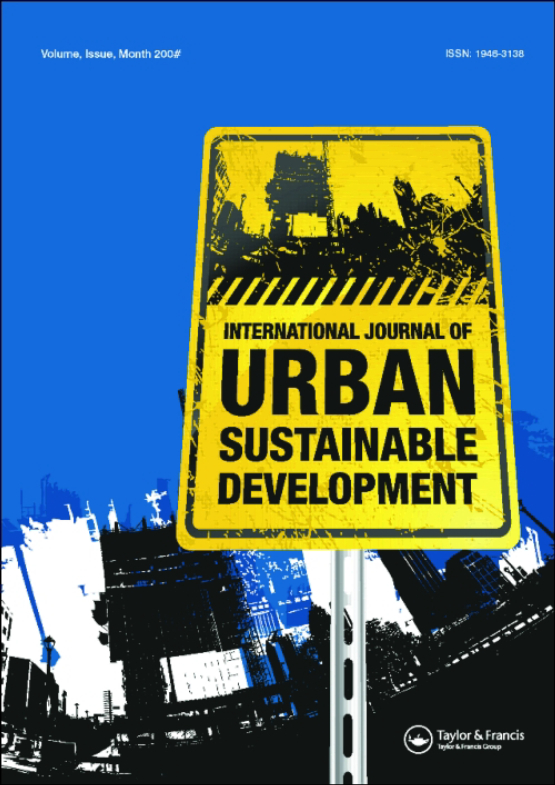Submit a Manuscript to the Journal
International Journal of Urban Sustainable Development
For an Article Collection on
Temporal Urbanism: Revisiting Past Urban Sustainability Knowledge to Shape Tomorrow’s Cities
Manuscript deadline


Article collection guest advisor(s)
Nabil Mohareb,
The American University in Cairo
nabil.mohareb@aucegypt.edu
Sherif Goubran,
The American University in Cairo
sherifg@aucegypt.edu
Temporal Urbanism: Revisiting Past Urban Sustainability Knowledge to Shape Tomorrow’s Cities
Cities are living palimpsests: tramlines beneath bike lanes, rain gardens occupying former parking lots, data cables threading through nineteenth‑century sewers, and green energy integrated into pre-existing buildings. Temporal Urbanism foregrounds this multilayered reality by treating time as both an analytic and design lens. This Collection invites scholarship to revisit and rethink seminal urban-sustainability propositions—thermal comfort, street trees from the 1970s, BRT corridors of the 1990s, smart-growth zoning from the 2000s, and global proliferation of building certifications into the 2010s—and examines how these ideas have crystallized, mutated, or vanished in the everyday city. Leveraging new tools—archival GIS, remote sensing time series, AI-driven historical data analysis—authors are invited to analyze and theorize the feedback loops between intention and outcome. By fusing retrospective scrutiny with prospective imagination, Temporal Urbanism asks: What can yesterday’s visions, tested by today’s evidence, teach about designing equitable, climate‑positive cities for 2050 and beyond?
Midpoint reports from the 2030 Agenda and the latest IPCC data reveal a stark truth: unfinished transitions, extensive urban growth, and the continued correlation between growth and emissions risk locking cities into carbon-intensive, unjust trajectories as climate extremes intensify. Many celebrated “green” projects now reveal performance gaps, rebound effects, displacement pressures, or maintenance shortfalls, while overlooked pilot studies quietly outperform newer, high‑tech solutions. However, systematic longitudinal evaluations remain rare, leaving practitioners to iterate blindly. Temporal Urbanism addresses this evidentiary gap. By mapping the durability—or fragility—of past interventions across environmental, economic, and social metrics, authors are asked to relook at the city to distil transferable lessons and cautionary tales. Such insight is indispensable for planners pursuing net‑zero roadmaps, for financiers evaluating stranded‑asset risks, and for communities demanding reparative justice. This Collection thus positions time-aware analysis as a strategic tool to accelerate transformative, rather than incremental, urban change.
This Collection directly addresses the pressing need for systematic, longitudinal evaluations of urban sustainability initiatives, a critical gap highlighted by the 2030 Agenda. It seeks original research articles that align with the journal’s scope, leveraging time as a core analytical lens to examine how past urban interventions have evolved. Multidisciplinary collaborations and mixed-method approaches are expected to integrate environmental, social, economic, political, spatial, and institutional dimensions and address the following intertwined strands:
- Past Research Realised – Empirical post-occupancy or policy audits of legacy initiatives (e.g., urban greening, mass transit, energy-positive building design, participatory governance).
- Current Insights – Data-rich analyses (e.g., socio-spatial analytics, equity audits) revealing intervention performance under contemporary conditions.
- Future Expectations – Forward-looking contributions harnessing digital twins, AI scenario modelling or regenerative design, to translate historical evidence into actionable blueprints for 2030-2050.
Keywords:
- Temporal urbanism
- Longitudinal Evaluation
- Sustainable futures
- Urban resilience
- AI‑driven planning
All manuscripts submitted to this Article Collection will undergo a full peer-review; the Guest Advisor for this Collection will not be handling the manuscripts (unless they are an Editorial Board member).
Please review the journal scope and author submission instructions prior to submitting a manuscript.
The deadline for submitting manuscripts is April 17, 2026.
Please contact Commissioning Editor Kara Roberts at Kara.Roberts@taylorandfrancis.com with any queries and discount codes regarding this Article Collection.
Please be sure to select the appropriate Article Collection from the drop-down menu in the submission system.
Dr. Nabil Mohareb is an Associate Professor of Architecture and Urban Studies at the American University in Cairo, specializing in advanced urban simulation systems and the impact of urban planning on social behavior and spatial-economic structures. He has held academic positions across Egypt, the UAE, and Lebanon, including serving as Chair Director of the Faculty of Architecture at Beirut Arab University, Tripoli Branch. His extensive research portfolio includes refereed publications and leadership experimental workshops across multiple countries. Dr. Mohareb serves as regional editor for the International Journal of Architectural Research and is a member of the International Union of Architects' Commission on Sustainable Development Goals.
Dr. Sherif Goubran is an Assistant Professor of Sustainable Architecture at The American University in Cairo. His work broadly focuses on building sustainability, combining qualitative and quantitative methods to explore the shift from incremental to transformational design in the built environment. Goubran’s interdisciplinary research spans architecture, building engineering, and real estate finance.
Guest Advisors do not declare any potential conflicts of interests in line with our Editorial Policies.
Benefits of publishing open access within Taylor & Francis
Global marketing and publicity, ensuring your research reaches the people you want it to.
Article Collections bring together the latest research on hot topics from influential researchers across the globe.
Rigorous peer review for every open access article.
Rapid online publication allowing you to share your work quickly.
Submission Instructions
All manuscripts submitted to this Article Collection will undergo desk assessment and peer-review as part of our standard editorial process. Guest Advisors for this collection will not be involved in peer-reviewing manuscripts unless they are an existing member of the Editorial Board. Please review the journal Aims and Scope and author submission instructions prior to submitting a manuscript.
